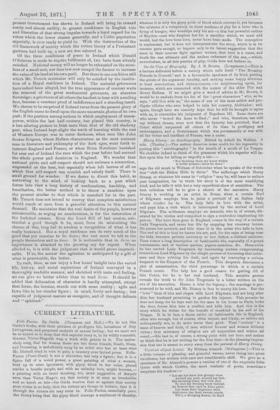Harry Disney : an Autobiography. Edited by Atholl De Walden.
3 vole. (Tinsley.)—The author deserves some credit for his ingenuity in putting this " autobiography " in the mouth of a monk of La Trappe. We shudder indeed to think of the penances which his superior will in- flict upon him for telling so ungodly a tale "For thinking them my heart within A treble penance most bo done," says the old monk to William of Doloraine when he speaks of the words that "cleft the Eildon Hills in three." The sufferings which Harry Disney, or whatever his name in "religion" may be, will have to endure pass imagination, for in truth his story is of the most unedifying kind, and he tells it with but a very superficial show of contrition. The best criticism will be to give a sketch of the narrative. Harry Disney is working as an artist in Rome, when a certain Earl of Edgware employs him to paint a portrait of an Italian lady whose eleisbeo he is. The lady falls in love with the artist, and pays him a visit which is interrupted by the arrival of Lord Edgware. The nobleman employs an assassin, who is, of course, dis- armed by his victim and compelled to sign a confession implicating his patron. The hero then goes to England, comes in the way of a certain Lady Tregonnie, and saves her life by stopping her runaway horses. He paints her portrait, and this time it is the artist who falls in love. The end of this is that he loaves his art, and, for the sake of being near the lady, becomes private secretary to her father, a Cabinet minister. Then comes a long description of fashionable life, especially of a grand tournament, and of various parties, pigeon-matches, dzo. Meanwhile he has served Lady Trogonuis by recovering certain compromising loiters from Lord Edgware by the simple process of hocussing that noble- man and then robbing his desk, and again by convoying a certain despatch to the Emperor of the French, This despatch denounces a plot of assassination, the chief personage in which is a certain French count. The lady has a good reason for getting rid of this Count, for ho is her real husband. This amiable person reveals the truth to Sir John Tregennis in a letter written on the eve of his execution. Hence a trial for bigamy ; the marriage is pro- nounced to be void, and Mr. Disney is free to marry his love. But the "love " tires of him and elopes with Lord Edgware, and not long after dies, her husband promising to pardon his injurer. This promise he does not keep, for he lays wait for the man in his house in Paris, looks the door, forces him into a conflict, and kills him. And this is the story which ho writes for the benefit of mankind in his oell at La Trappe. It is, in fact, a fierce satire on fashionable life in England, often true enough, but of course, often unjust, and likely, as satires not unfrequently are, to do more harm than good. That "society" is a Mass of knaves and fools, of ,men without honour and women without virtue ; that ministers of religion are all hypocrites and critics all venal,—this last is, of course, a strong point with our horo, and makes us think that lie is not writing for the first time—is the pleasing impres- sion that one is meant to carry away from the perusal of Harry Disney.






























 Previous page
Previous page